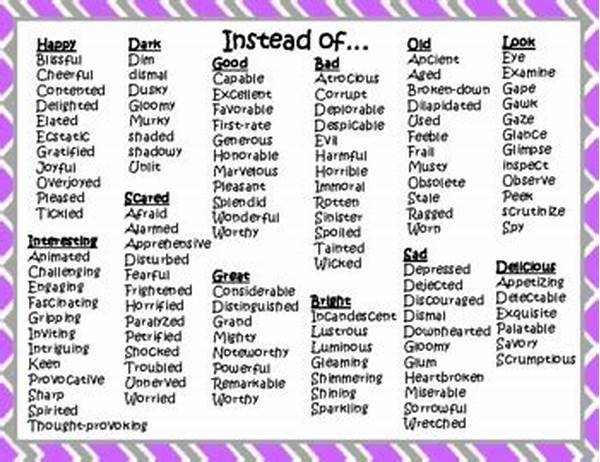Stepping into the world of writing can be both exciting and overwhelming. Familiarity with language is comforting, yet it often leads novice writers to over-rely on certain words and phrases. These overused words can muddy the clarity of writing and stifle creativity. Understanding these common pitfalls can elevate your writing and set you apart from the crowd.
Why Are Overused Words a Problem?
Overused words bring uniformity to the table, which might sound like a good thing at first. However, when every sentence sounds similar, the impact of your message diminishes. Imagine reading an essay where every paragraph begins with “basically” or “actually.” These overused words novice writers use often serve as fillers that weaken the message rather than enhance it. By depending on these words, rookie writers miss the opportunity to expand their vocabulary and express their ideas more uniquely. When crafting a compelling narrative, every word counts, and the deliberate choice of less-common synonyms or restructuring sentences can convey your thoughts more powerfully. Breaking free from this habit requires awareness, patience, and a willingness to experiment with language.
It’s not just the choice of words but also the frequency with which they’re used that determines a writer’s style. An abundance of overused words novice writers use can make their work predictable and monotonous. Readers tend to lose interest when writers recycle the same expressions repeatedly. As a writer seeking to engage and influence, understanding how to avoid overused words can contribute significantly to creating a compelling and dynamic piece of work.
Recognizing Overused Words
1. Basically: This word is often used to simplify what’s being explained, but it usually isn’t needed.
2. Actually: Used for emphasis, this word can often be omitted without changing the sentence.
3. Very: To intensify a description, but alternatives can often deliver more punch.
4. Literally: Rarely used correctly, it’s often just filler.
5. Just: It’s an unnecessary addition that makes sentences less direct.
Strategies to Avoid Overused Words
One effective strategy for avoiding overused words novice writers use is to expand your vocabulary. Having a rich arsenal of words at your disposal allows you to express ideas more diversely and captivatingly. Reading widely is one way to build this arsenal. The more you read, the more you expose yourself to different styles and vocabularies. Consider keeping a vocabulary notebook where you jot down interesting words you come across.
Another approach is to practice writing with intentionality. Before you start writing, outline your key points and think about the best way to convey them without falling back on clichés. Reread your work and critically examine it for repetitive language. This self-editing process helps you identify patterns and make conscious decisions about word choice. With time and practice, you’ll develop a natural feel for when a word is genuinely necessary and when it is just filling space.
Techniques to Identify Overused Words
1. Read your work out loud. Often, hearing the words helps to spot overused patterns.
2. Use digital tools such as word clouds to visualize word frequency.
3. Have someone unfamiliar with your work review it for unconscious repetitions.
4. Keep track of feedback from editors or readers to identify recurring comments about word choice.
5. Practice rewriting sentences with different structures to minimize repetitive usage.
The Impact of Overused Words
Novice writers often underestimate the impact that overused words can have on the reader’s experience. When a piece of writing is bogged down with repetitive and uninspired language, it loses the distinct voice that draws readers in. Overused words novice writers use might seem harmless at first, but they can erode the quality of the narrative and distract from the message. On the other hand, well-selected words can breathe life into a narrative, making it compelling and engaging.
Moreover, an adept choice of vocabulary can showcase the writer’s personality and perspective, elements that are crucial in establishing a connection with the reader. By substituting tired and worn-out words with fresher ones or using more precise language, writers can create vivid imagery and maintain the reader’s interest. As such, being mindful of overused words isn’t just about showcasing linguistic prowess; it’s about enhancing the storytelling and communication experience overall.
Overcoming the Habit
Creating a habit of avoiding overused words involves regular practice and the willingness to challenge oneself. Novice writers should embrace writing exercises that compel them to think creatively, such as crafting stories using a limited vocabulary or employing constraints that discourage the use of overused words. Over time, these exercises train the mind to naturally veer away from cliched language and embrace more inventive expressions.
Being aware of the influences on your writing, such as the books you read or the media you consume, can also offer insight into your tendencies towards certain overused words. Engage with content that showcases diverse and dynamic language, as this can inspire and diversify your own writing style. Remember, the journey to becoming a skilled writer is iterative, and refining your word choice is a key part of that process.
Embracing Variety in Writing
Embracing variety in writing is about more than just avoiding overused words novice writers use; it’s about fostering a love for the richness of language. Understanding synonyms, experimenting with sentence structure, and playing with rhythm and pace are all part of creating a compelling text. Engaging with the language in this way encourages writers to reflect deeply on the message they wish to convey and the most effective means to do so.
Developing a unique voice is one of the most rewarding aspects of improving your writing skills. As you move away from overused words and explore new linguistic territories, you’ll find that your writing not only improves but also becomes an authentic reflection of your thoughts and personality. So, take the leap, break free from the mold, and let your creativity shine.
